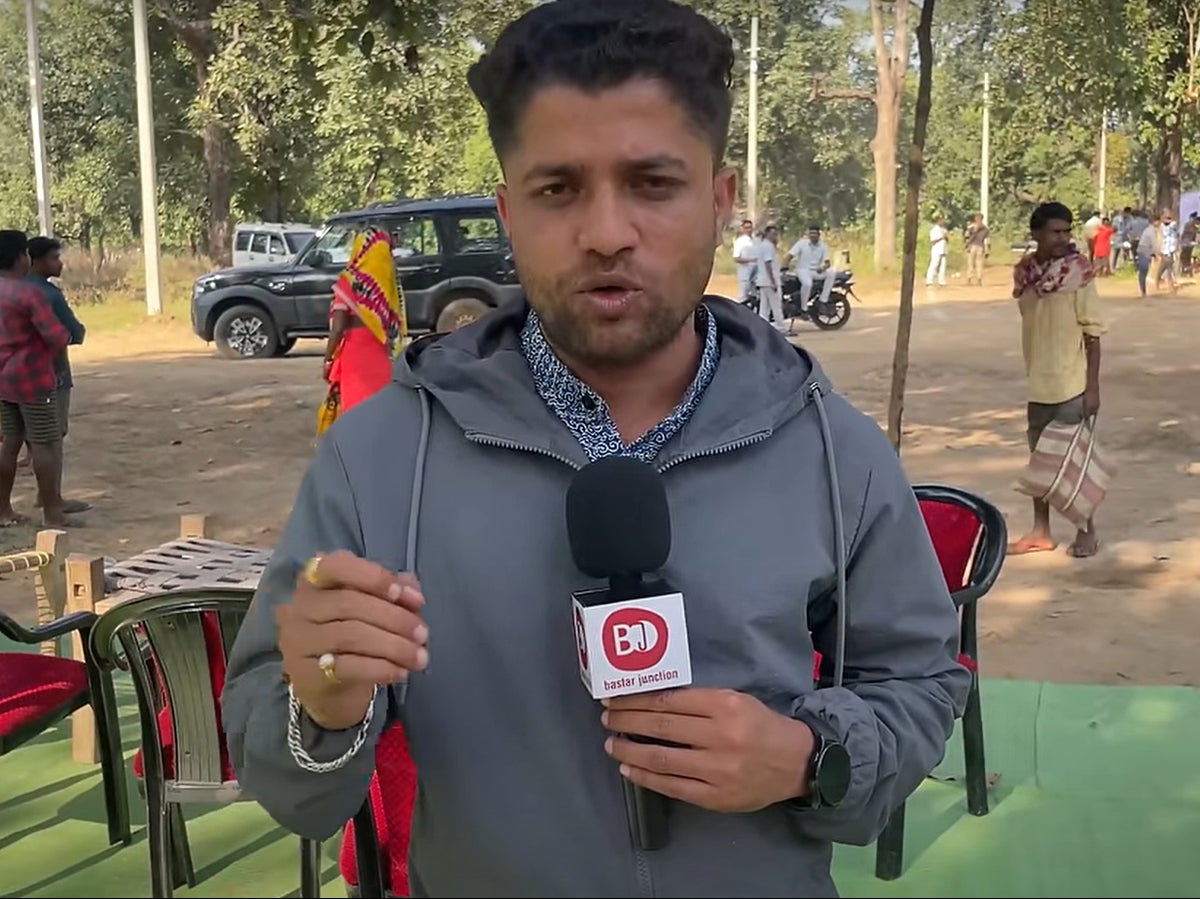
The body of a missing investigative journalist has been found on a property linked to a man he had recently exposed for alleged corruption in India, police say.
Mukesh Chandrakar, 28, a freelance journalist who ran a YouTube channel called Bastar Junction in the central Chhattisgarh state, had been missing since New Year’s Day.
His reporting had uncovered alleged irregularities in a £11.8m road construction project in the Bastar region, a hotbed of Maoist insurgency, prompting a government investigation.
Police found the journalist’s last known meeting was with Ritesh Chandrakar, the brother of contractor Suresh Chandrakar, at one of the latter’s properties in Bijapur district.
ADVERTISEMENT
The reporter’s brother, Yukesh Chandrakar, had filed a missing persons report after he could not reach him on the phone.
“A preliminary investigation revealed that Mukesh had been missing since 1 January. CCTV footage and phone tracking led us to the location, where we found his body inside a newly floored septic tank,” a police officer told India Today. Police said his injuries were consistent with a blunt-force assault.
The body was found on 3 January.
Police arrested the contractor and booked him as the main accused in the murder of the journalist. “The main accused of Mukesh Chandrakar’s murder, the local contractor Suresh Chandrakar, was arrested by SIT from Hyderabad in the wee hours of Monday. Interrogation of the accused is going on,” the Bijapur police said in a statement on Monday.
The contractor’s brothers, Ritesh and Dinesh Chandrakar, and a man identified only by the first name Ramteke were also arrested.
VIDEO | Here’s what Chhattisgarh Deputy CM Vijay Sharma (@vijaysharmacg) said on the killing of a journalist in Bijapur.
“Mukesh Chandrakar was close to me. May his soul rest in peace and may God give strength to his family. Vishnu Deo Sai has assured to provide aid to his… pic.twitter.com/TjTyo6qNrb
— Press Trust of India (@PTI_News) January 4, 2025
“Our investigation revealed that Ritesh Chandrakar was related to Mukesh and the two frequently interacted,” Bastar police chief Sundarraj P told a press conference.
ADVERTISEMENT
“On 1 January at 8pm, they spoke on the phone before both went to Suresh Chandrakar’s compound in Chattanpara for dinner. An argument ensued when Ritesh accused Mukesh of interfering with their construction work,” said Mr Sundarraj.
“Ritesh and Ramteke then attacked Mukesh with an iron rod, placed his body in a septic tank, and sealed it. Ritesh contacted his older brother Dinesh, along with Suresh and other family members. They met at Bodli village and conspired to destroy evidence.”
Chhattisgarh’s chief minister, Vishnu Deo Sai, condemned the killing, calling it a “profound loss to journalism and society”. “The murder of young and dedicated journalist Mukesh Chandrakar is heartbreaking,” he said.
“The culprits will face the harshest punishment.”
Deputy chief minister Vijay Sharma announced the formation of a special investigation team to fast-track the case.
ADVERTISEMENT
The Press Council of India and the Editors Guild of India have demanded a thorough inquiry, describing the journalist’s death as a matter of “grave concern”. They also urged the government to prioritise journalist safety, particularly for those involved in field and investigative reporting.
Protests have been staged by local journalists in Bijapur, demanding strict action against the perpetrators.
Mukesh Chandrakar was previously recognised for his role in securing the release of police commando Rakeshwar Singh Manhas, who had been abducted by Maoists militants in 2021.
Chhattisgarh, rich in minerals but mired by corruption and violence, remains one of India’s most perilous regions for journalists.
India ranks 159 in the World Press Freedom Index out of 180 countries, according to Reporters Without Borders.
EMEA Tribune is not involved in this news article, it is taken from our partners and or from the News Agencies. Copyright and Credit go to the News Agencies, email news@emeatribune.com Follow our WhatsApp verified Channel



